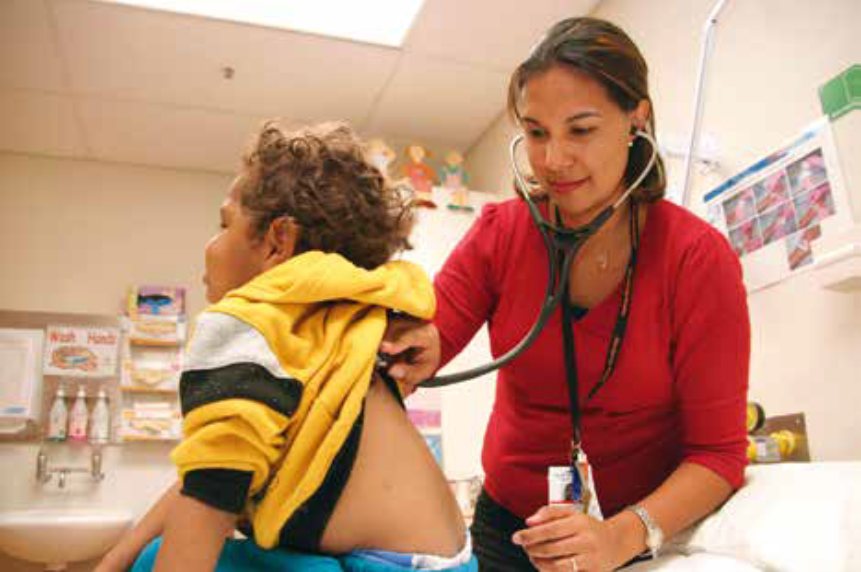 Dr Kim Isaacs is from Broome in WA. She is a Noongar on her father’s side (south-west WA) and a Karajarri and Yawuru on her mother’s side (west Kimberley). Her skin is Barrjarri, and her name is Jacoora. Her maternal grandparents were traditional people from Bidyadanga and Thangoo station. Her grandfather was a Yawuru senior law man and medicine man. Her mother became one of the _rst nurses from Broome and she has worked over 50 years in nursing. Her mum continues to work in the field and currently looks after renal dialysis patients who are in Perth waiting to return to their communities. Her father has been involved with many government and community controlled boards over a long period. Kim credits her parents’ tireless work in Aboriginal and Torres Strait Islander health as the reason why she followed in their footsteps and became a GP.
Dr Kim Isaacs is from Broome in WA. She is a Noongar on her father’s side (south-west WA) and a Karajarri and Yawuru on her mother’s side (west Kimberley). Her skin is Barrjarri, and her name is Jacoora. Her maternal grandparents were traditional people from Bidyadanga and Thangoo station. Her grandfather was a Yawuru senior law man and medicine man. Her mother became one of the _rst nurses from Broome and she has worked over 50 years in nursing. Her mum continues to work in the field and currently looks after renal dialysis patients who are in Perth waiting to return to their communities. Her father has been involved with many government and community controlled boards over a long period. Kim credits her parents’ tireless work in Aboriginal and Torres Strait Islander health as the reason why she followed in their footsteps and became a GP.
Kim completed her general practice registrar training in Broome and stayed on to work at the Broome Regional Aboriginal Medical Service. Her love for the Kimberley and the opportunity to spend more time with her family while working with the community is what convinced her to stay following a two-week trek in the East Kimberley. Medicine was her second degree after completing a Bachelor of Commerce in 1999. Kim completed her medical program at the University of Western Australia. She enjoyed her paediatric terms at the Alice Springs Hospital and Princess Margaret Hospital; however, she wanted to treat the whole family and chose the general practice training pathway to realise this goal.
Kim has extensive experience in Aboriginal and Torres Strait Islander health as a patient, as a child watching her parents working in the sector, as a medical student, and now as a health professional. In addition to her experience in the hospital system and mainstream general practice, she has worked on Aboriginal health policies for the state Department of Health. Kim hopes to one day work with more Aboriginal and Torres Strait Islander health professionals.
On ‘closing the gap’, Kim believes we have a long way to go and that it is not just her peoples’ health that needs addressing. Rather, a holistic approach is required – one encompassing housing, employment and education, and addressing poverty, poor nutrition, and safety in homes. She sees a need to address issues such as children in crisis, domestic violence, homelessness, poverty, drug addiction and child protection, through a team of people on the ground consisting of local Aboriginal and Torres Strait Islander liaison officers and social workers. There must be grassroots-level communication and control. Kim believes real solutions to achieving better health outcomes require long-term sustainable funding, investment in future generations and our children, and strong, consistent health leadership coming from Aboriginal and Torres Strait Islander health service providers and government leaders.
Kim’s current workplace, an Aboriginal medical service, is a busy community clinic. Very sick patients from all across the Kimberley region pass through the clinic. Consults can be long due to the complexity of the patient presentations. The clinic manages acute emergency department–type presentations and handles many chronic diseases. The service sees many children with a wide range of complex issues.
Kim has a young baby and is currently figuring out her work–life balance. She would like her son to have the opportunities that her grandparents and parents did not have. She also hopes that her son takes his education seriously, but is also strong in his Aboriginal culture. Kim has a passion for the Kimberley and the lifestyle it affords her, relaxing at the beach, walking her dog, visiting family, fishing and catching up with friends.
First published in: The Royal Australian College of General Practitioners. Closing the gap with the RACGP’s Aboriginal and Torres Strait Islander GPs. East Melbourne, Vic: RACGP, 2016